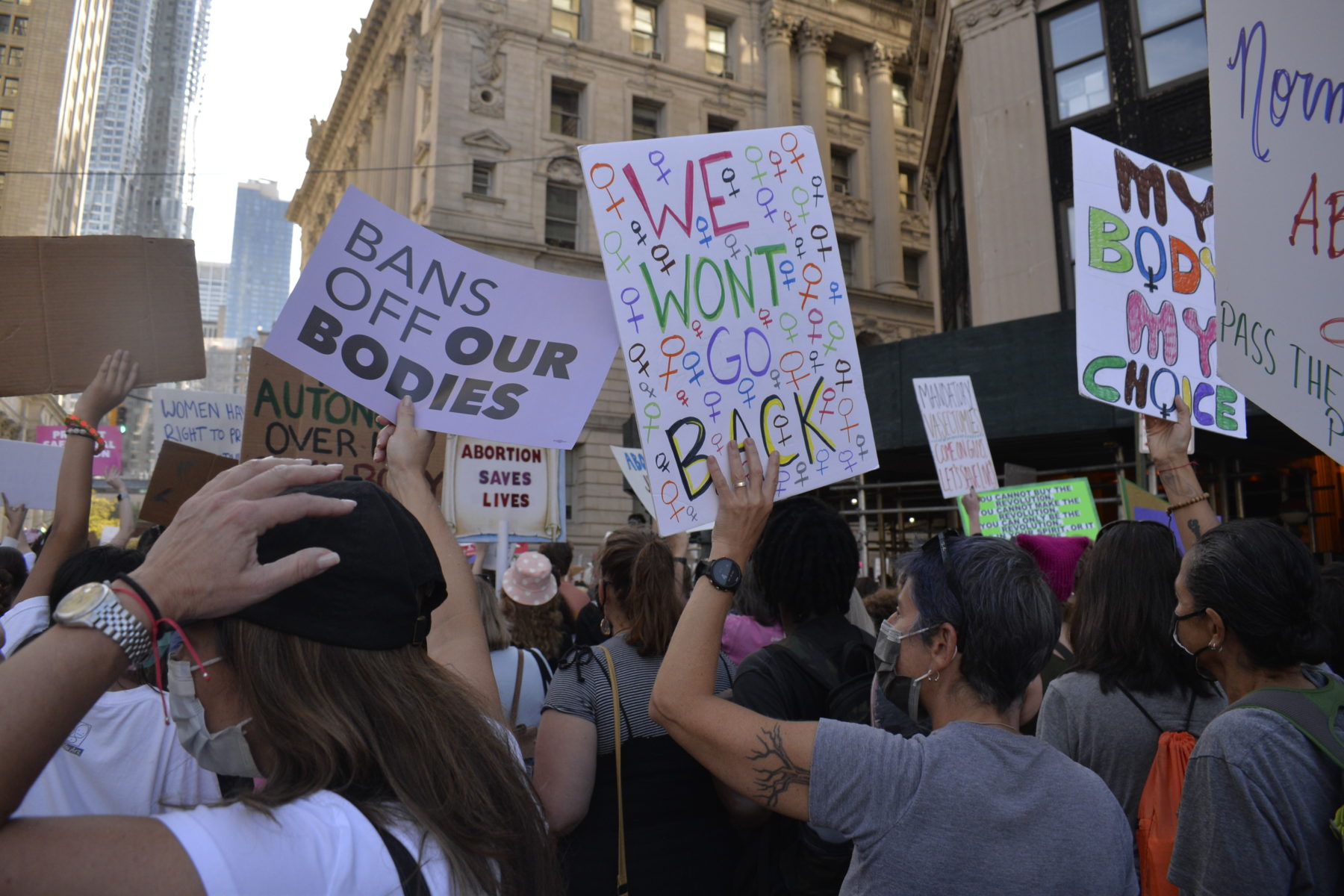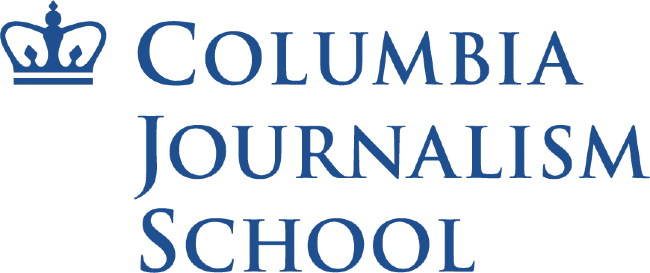
On a busy Bronx street, near the intersection of Courtlandt and E. 149th, there is a Planned Parenthood that is mostly hidden from public view. A passerby might think they’ve spotted it across the street, where there are signs for free pregnancy tests and ultrasounds on a second floor window, above a Mr. Income Tax and a Bronx Ink tattoo shop. There are other signs, too: one of a woman holding her head with her hand, her eyes closed — the stress she bears illuminates through the photo.
This is not, in fact, Planned Parenthood, but a place called EMC Pregnancy Center, short for Expectant Mother Care. If someone searches for “pregnancy care center” on Google Maps, this center comes up as a result, but on its website, a tagline reads: “Fighting for life in NYC – The Abortion Capital of America.”
EMC is a crisis pregnancy center (CPC), or a “fake abortion clinic,” a term coined by pro-choice activists, which have multiplied across New York City, and the country, since the early 2010s. While EMC never says they provide abortions, they do not provide the unbiased and secular care many pregnant people might expect.
Nationwide, there are approximately 2,700 fake abortion clinics, more than three times the amount of real, abortion offering clinics, said Sonya Borrero, director of the Center for Women’s Health Research and Innovation at the University of Pittsburgh, in an interview with Capital News Service. In New York City, as of 2017, there were 252 places that provide abortions, and 113 of those were clinics, according to the Guttmacher Institute. A study from the University of Georgia found that, as of 2018, there were 107 CPCs in the state of New York.
In New York, legislation is expected to be reintroduced in the Senate and Assembly as the new legislative session ramps up. The bill aims to study these centers and better understand how they are funded and by whom, the number of people who access these CPCs, how far away these people are from licensed medical abortion clinics, basic demographic information, and much more. Senator Brad Hoylman, the sponsor of S470, hopes that the bill will lead to the collection of data that show a full picture of accessible reproductive care across the five boroughs and the state. Hoylman represents parts of Midtown and lower Manhattan.
“I can’t imagine there’d be significant opposition from my colleagues in just trying to study this issue more and get a better sense as to what actually happens here,” said bill co-sponsor Senator Andrew Gounardes, one of the bill’s 14 overall, regarding whether he thinks the bill will pass.
The bill, if passed, would direct the Department of Health to study CPCs and the unmet health needs of people throughout New York and would prompt lawmakers to make policy recommendations to the legislature.
“Pregnancy [crisis] centers are unlicensed entities in New York,” said Maia Berlow, Senator Hoylman’s deputy chief of staff. “They don’t have healthcare licenses, and they often will offer pregnancy-related services such as pregnancy tests or an ultrasound, but they don’t refer out for comprehensive reproductive health services — [like] contraception or abortion care — and they may not offer timely and comprehensive reproductive and sexual healthcare.”
CPCs like Expectant Mother Care in the Bronx are privately owned but are tax exempt because they are considered a 501 (c)(3) organization, or a nonprofit. Other pregnancy resource centers, like Planned Parenthood, are funded through Title X, which is a federal program created in 1970 that funds family planning. Christopher Slattery, founder and CEO of Expectant Mother Care, declined to be interviewed for this story.
The bill will study all CPCs that are not licensed health care facilities and those that do not provide a “full range of comprehensive reproductive and sexual health care services” like contraception, testing and treatment for sexually transmitted diseases and infections, and abortion and prenatal care. Therefore, privately owned CPCs, as well as the several backed by the Roman Catholic Archdiocese of New York, are included in the study. The results of the study, however, will only hopefully create a baseline for future regulation and legislation.
“I support the bill because I think that there are some concerns about the impact of crisis pregnancy centers, that are not currently regulated in our state, and I think it’s important that we get a better sense as to what these centers are doing, what services they’re providing and making sure that no one who goes to these centers are being misled [about] what the center’s can offer them in terms of what they need at that moment,” Senator Gounardes said.
The future of the bill could help educate the public on the pregnancy resources available to them, in hopes to limit the spread of misinformation surrounding abortion access in New York City. With more education, when people Google “pregnancy care center” and church-backed CPCs are the results, they might stop to consider what resources are actually available, and who is providing them.
The Bridge to Life, Inc. located in Astoria, Queens is owned by Our Lady of Mount Carmel, according to filing information from the NYC Department of Buildings, and is included in “pregnancy care center” related online searches. Our Lady of Mount Carmel is located in East Harlem, and is under the authority of the Archdiocese.
The Church of St. John Nepomucene, a Roman Catholic Church in Midtown East, owns another CPC: the Visitation Center of New York. This center educates on different pregnancy options — like parenting and adoption — but, describes abortion on their website as something that is “promoted as a choice that will quickly relieve the burdens of an unexpected pregnancy without consequences.”
“Your dreams are still possible,” their website states. “Let hope draw you past fear to live true to yourself and without regrets. We will help you find a way.”
Maternity Birthcare Services, which has a listed address of the Archdiocese of New York’s main office, is owned by the Archbishopric of New York, or the office of the Archbishop, and operates under the Eccelesiastical Assistance Corporation.
Pro-Truth, a New York-based coalition that includes Planned Parenthood, the National Council of Jewish Women New York, and City Council member Helen Rosenthal, among others, formed in June 2018 to “fight fake abortion clinics,” according to its website. Pro-Truth describes these clinics as “dangerous and deceptive” in how they “use lies, manipulation, and intimidation to prevent people from choosing or accessing abortions.” The coalition also links resources for people to access, including New York state’s site for family planning services.
For example, some of these clinics suggest that the side effects of abortion include breast cancer, infertility or mental illness. They also promote “abortion pill reversal,” which is when a large amount of progesterone (the counteracting agent to mifepristone, which is the catalyst for abortion in abortion pills) is injected into a pregnant woman. This is said to reverse the affects of the initial dose of an abortion pill, which is usually administered in two doses — one pill of mifepristone, and one pill of misoprostol.
However, the American College of Obstetricians and Gynecologists has said that these so-called “reversals” are “not supported by science.”
“Abortion reversal is not a medical term, because no such medications exist,” said Jiana Menendez, MD, of the Institute for Family Health. “Claims that taking progesterone after the first step of the two-drug regimen for medication abortion, in order to interrupt the process, are both ineffective and dangerous.”
This medical misinformation, paired with misleading advertising surrounding services offered in CPCs, contribute to their deceptiveness.
“There are laws around false advertising and several New York Attorney’s General have investigated these types of facilities for both advertising and unlicensed practice of medicine,” Berlow said. As the S470 bill is focused on a study, any further action regarding penalties for illegal activity, if necessary, would be taken by the legislature.
In 2011, lawmakers in New York City passed Local Law 17, prohibiting deceptive advertisements from CPCs and requiring disclosure of all available services. CPCs are considered commercial businesses, rather than medical facilities, because they can provide goods and services such as diapers and sonograms, but also have “the opportunity to advocate against abortion and either delay or prevent the decision to terminate a pregnancy.” This, in turn, prohibits false advertising because as commercial businesses, they are providing goods and services, but in doing so can advocate against abortion and push forward their own rhetoric.
The CPCs still nonetheless continue to exist, as they are protected under the First Amendment and their right to freedom of speech.
S470 would study these CPCs to create a clearer landscape of the issue and how wide it might span, and ensure that New Yorkers know what services are provided by the CPCs, what information is given by them to pregnant people in New York and where the gaps in their medical knowledge and abortion access in general are, according to Berlow.
“Often, these centers are giving people very helpful services,” Berlow said. “They provide free diapers in a community that doesn’t have access to [low-cost] childcare products, so that is important for us to know the need isn’t being met.”
Katie Finnigan, an organizer for NYCForAbortionRights, a grassroots organization that fights for abortion access and reproducive justice, says that while some of these clinics provide diapers and even housing assistance, it seems to come with the expectation that those assisted by the CPCs will then join and attend the church.
“They’re saying that once you have your baby you’ll be supported by this entity that isn’t really supporting you,” Finnigan said.
NYC4AR organizer Anne Rumberger says that New Yorkers might be unaware of the prevalent anti-abortion movement right in their own neighborhoods, since abortion access is protected in the state.
“I think there is a sort of sense of complacency,” she said. “There are still [anti-abortion people] here, it’s still being shamed and stigmatized, and there’s still crisis pregnancy centers misleading people. Hopefully there will be a mass movement for abortion access and reproductive justice that even in New York we can contribute to.”
About the author(s)
Susanna Granieri is a full-time M.S. student at Columbia Journalism School and received her B.A. in journalism from the State University of New York at New Paltz.



